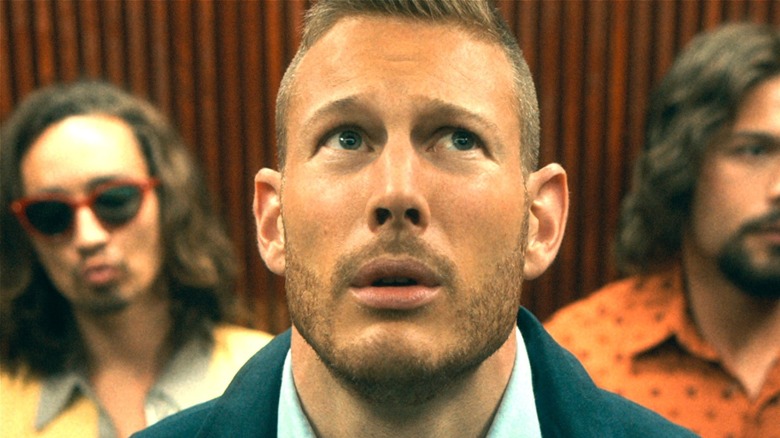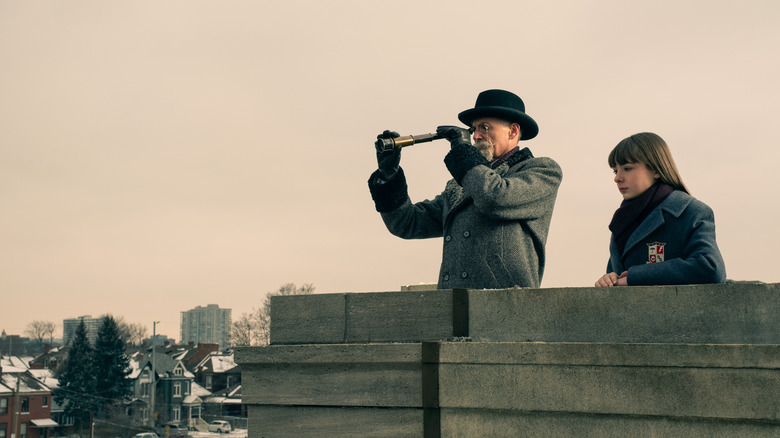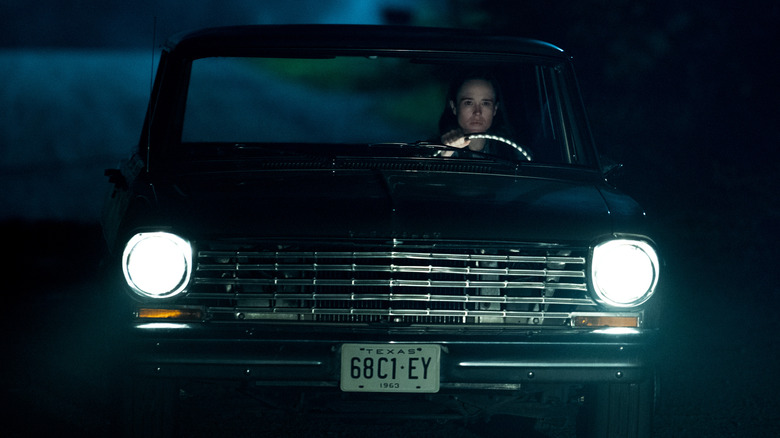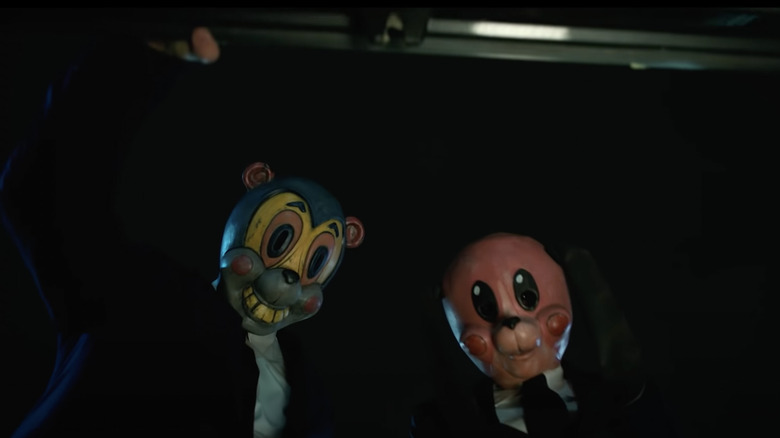The Four Iconic Directors Who Inspired The Umbrella Academy's Unique Look
The aesthetic giving life to the atmosphere surrounding the Hargreeves siblings in Netflix's "The Umbrella Academy" is distinct in tone. Without a doubt, the series showrunner Steve Blackman and its co-creators, Gerard Way and Gabriel Ba (who also wrote the comics), have created a world that resonates with millions of viewers (via Business Insider). The world-building and mise-en-scene — a term relating to the composition and design of the surrounding environment and how that influences the setting and characters in a scene (via Studio Binder) — is alive with earthy, natural tones that mix with darker color palettes. It also gives off a gritty "Watchmen"-esque type of vibe, as well.
Of course, the inspiration for the heightened reality that the Hargreeves exist within is shaped and molded from other visual concepts, primarily from the works of certain iconic filmmakers. During a Reddit AMA, Blackman referenced a few creative inspirations that are responsible for helping establish the unique look of "The Umbrella Academy." So, who are the four iconic directors whose work inspired this show's style?
Wes Anderson's avant-garde filmmaking is a huge inspiration
In a Reddit thread posted by u/netflix, Steve Blackman answered fan questions pertaining to all things "The Umbrella Academy." U/BrunetteAmbition88 asked about the specific style and design inspirations for the show. "Wes Anderson was definitely an inspiration," Blackman responded. "In particular, I love 'The Royal Tenenbaums.' Wes' style is so specific and he has a remarkable ability to portray deeply flawed characters who are incredibly lovable." The fact that the Hargreeves siblings come from an unusually dysfunctional family also certainly mirrors the kinds of characters that live and breathe in Anderson's films.
According to Blackman, the Anderson influences were intentional homages from the beginning of the show's inception. In an interview with NME, he stated that his idea for "The Umbrella Academy" was, at its heart, always going to focus on the dysfunctionality of one family. This Andersonian aspect is a prominent part of the Hargreeves family dynamic, but it's not the only way that Anderson's work inspires the series.
Blackman often incorporates color into the sets and the aesthetic of the series in a manner very much like Anderson's cinematic vision. Anderson is known for his striking color compositions (via StudioBinder), and the show also routinely utilizes stark contrasts between dark and light. For example, the Season 1 scene of Reginald Hargreeves (Colm Feore) and his young daughter, Vanya (T.J. McGibbon), on a city rooftop with binoculars is largely reminiscent of the use of space and framing in "The Royal Tenenbaums."
The Coen brothers' dark, whacky aesthetic is another inspiration
While Wes Anderson is the most prominent inspiration for the look and feel of "The Umbrella Academy," filmmakers Joel and Ethan Coen are among the two other directors whose quirky and sometimes random storytelling techniques are subtly referenced in the show.
The Coen Brothers are notorious for their impressive telling of bleak stories replete with copious amounts of black comedy mixed in. Their films are at times absurd and shocking, and they often present a rather exaggerated reality to viewers. According to NoFilmSchool's video essay, the Coens see the world as "a disgusting cesspool of beauty and pain and love and hate and murders" and the big picture takeaway is that, "The darkness and comedy of life exist side by side."
In Blackman's response in the aforementioned subreddit thread, he responded as to why the Coens are such a big influence on the Netflix show. "I love the way they tell stories," Blackman wrote. "They always find a way to subvert expectations. You think you're going one way, but you suddenly find yourself going another." No matter how violent "The Umbrella Academy" gets, and no matter how broken down the characters become, there is always some glimmer of humor, even when our heroes' external and internal worlds are being torn to pieces. Just like in productions by the Coen brothers, joy and despair exist right alongside each other.
Blackman built upon Tarantino's signature film style
In another part of his response, Steve Blackman cited Quentin Tarantino as a filmmaker whose cinematographic flares and signatory stylistic aspects serve as inspiration for the series. "I love Quentin Tarantino," Blackman wrote. "His use of music and camera movement is phenomenal and inspiring."
Of course, most film aficionados need no introduction to Tarantino. Since the release of 1992's "Reservoir Dogs" and 1994's "Pulp Fiction," the auteur has built a reputation as one of Hollywood's most visionary minds. Best known for his love of swearing and violence in film (via The Atlantic), Tarantino is also known for his unique approach to filmmaking. One of the director's most recognizable marks involves shooting actors from the low vantage point of the trunk of a car. This style has appeared in everything from 2003's "Kill Bill: Volume 1" to 1997's "Jackie Brown" (via Premium Beat).
This type of shot also appears in "The Umbrella Academy." At the end of Season 1, Episode 3 ("Extra Ordinary"), there's an homage to Tarantino's trunk-open reveal scene with the time-traveling antagonists who work for The Commission, Hazel (Cameron Britton) and Cha-Cha (Mary J. Blige). In the scene, Hazel and Cha-Cha kidnap scared, towel-wearing Klaus Hargreeves (Robert Sheehan) and place him in the trunk of their car. The iconic shot will make any Tarantino fan gleefully smile.



